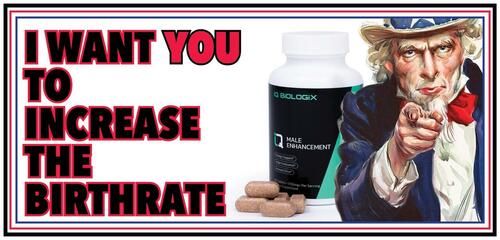
As Birth Rates Decline, Here’s How To Boost Fertility
Authored by Mary West via The Epoch Times (emphasis ours),
Last year, the U.S. fertility rate reached an all-time low, according to World Bank data. For those concerned about infertility, it may be a good idea to consider interventions that improve health, as they can boost the chance of becoming pregnant.

Optimal fertility is really just an expression of optimal health, Jessica Sharratt, doctor of acupuncture and oriental medicine at Heal Los Angeles, told The Epoch Times.
“When your metabolism, hormones, immune system, and mitochondria are thriving, your reproductive health benefits, too.”
In some cases, lifestyle changes alone can make a significant difference, as they not only boost fertility but also lay the foundation for a healthier pregnancy, said Drs. Abby Eblen, Carrie Bedient, and Susan Hudson, reproductive endocrinologists and co-hosts of the Fertility Docs Uncensored podcast.
“However, lifestyle changes and medical treatments often work best in conjunction with each other,” they told The Epoch Times.
Sharratt suggests lifestyle changes 3–6 months before trying to conceive, to give time for healthier eggs to develop.
1. Pursue an Optimal Weight
A review published in the International Journal of Medical Sciences suggested that modest weight loss is important for fostering fertility. Outcomes in women include improvements in reproductive hormone profiles, menstrual cycle regularity, ovulation, conception, and pregnancy. Outcomes in men include improvements in reproductive hormone profiles, sexual function, and sperm form and movement.
Dr. David Ghozland, board-certified in obstetrics and gynecology in Orange County, California, said in an email to The Epoch Times that he often sees the benefits of weight loss on fertility in his practice. One of his patients, a 28-year-old, had been trying to conceive for 18 months. Last month, after losing only 22 pounds over the course of four months, she became pregnant.
He said that the metabolic link is much more profound than most physicians realize. The mechanism is that visceral adipose tissue produces inflammatory chemicals that act directly to disrupt follicular development, which precedes egg formation. Reducing inflammation through weight loss creates conditions in which conception may again become possible naturally.
“In my clinic, [in vitro fertilization] IVF patients who enhance their metabolic health before using fertility medications experience success rates that are 65 percent higher during their initial IVF cycle,” said Ghozland.
2. Eat a Healthy Diet
Nutrition plays a big role in reproductive health, Amy Chow, a registered dietitian at BC Dietitians, said in an email to The Epoch Times.
The food we eat can influence hormone balance, egg and sperm quality, and the body’s ability to conceive. Aside from providing energy, nutrients play bioactive roles that support reproductive function, reduce inflammation, and help regulate key processes such as ovulation.
A review published in Biology found that the Mediterranean diet protects against infertility, while the Western diet increases risk.
Fatty acids are an example of a nutrient with bioactive properties, said Chow. In the Mediterranean diet, sources such as olive oil, avocados, nuts, and seeds, and fatty fish provide healthy fats that reduce inflammation and support fertility. In contrast, the Western diet’s trans fats—common in processed and fast foods—promote insulin resistance and inflammation, which can impair ovulation and lower fertility, according to cohort studies.
The type and quality of proteins eaten also affect fertility, she said.
Plant-based proteins, such as those in beans, tend to support fertility, while excessive intakes of animal proteins may be linked to a higher risk of infertility. Research suggests that animal protein is linked to a high risk of anovulation—the failure to ovulate—while replacing some animal protein with plant protein reduces the risk of anovulation infertility.
Concerning carbohydrates, Chow recommends focusing on whole, fiber-rich, and low-glycemic index options, which can help stabilize blood sugar and support the body’s natural hormonal regulation. Examples include brown rice, old-fashioned oats, and 100 percent whole-grain bread. In contrast, high-glycemic foods include cookies, crackers, cakes, white bread, and sugary beverages.
“People with or without hormone-related conditions, like [polycystic ovary syndrome] PCOS or endometriosis, can benefit from dietary improvements,” Chow said.
Endometriosis causes infertility through multiple factors, including disrupted ovary function and a reduced capacity to support the implantation of a fertilized egg due to scarring.
Chow added that while fertility supplements are widely marketed, dietitians always advise a “food-first” approach. Most people can meet their nutritional needs through a balanced diet.
“An important practice that impairs fertility is undereating, which includes excessive weight loss, stress, and exercise,” Shira Sussi, a prenatal dietitian, said in an email to The Epoch Times.
When the body doesn’t get enough food for energy, this deficit can lead to low levels of estrogen, sometimes accompanied by high cortisol (stress hormone), as well as low thyroid and insulin levels, she said.
Sussi noted that severe undereating can disrupt hormones and lead to functional hypothalamic amenorrhea, a condition that stops ovulation. “I would even argue against practicing intermittent fasting when trying to conceive, given this link between undereating, ovulatory dysfunction, and hormone imbalance,” she said.
3. Manage Stress
Laurie Binder, a doctor of acupuncture with Santa Monica Acupuncture and Wellness, said that in both sexes, managing stress is vital. High cortisol levels can disrupt the delicate balance of reproductive hormones. Acupuncture does this by activating the parasympathetic nervous system, encouraging the body to shift from a “fight-or-flight” state into a “rest-and-reproduce” state.
(Stress management solution)
When the body is in a fight-or-flight state—sympathetic nervous system dominance—stress hormones such as cortisol and adrenaline rise. These hormones can interfere with ovulation and reduce blood flow to the reproductive organs. Essentially, the body prioritizes survival over reproduction, she said.
Substances that strain the body—whether recreational, prescription, or excessive caffeine, tobacco and alcohol—can also quietly undermine fertility. A review published in Reproduction and Fertility advises the following:
- Refrain from using recreational drugs, which increase the risk of sexually transmitted diseases and infections that lead to infertility.
- Avoid taking unnecessary prescription drugs, as many of them affect reproductive processes.
- Limit excessive caffeine intake, which can worsen fertility problems.
Additionally, regular exercise is a powerful tool for reducing stress, offering particular benefits for women coping with infertility.
Read the rest here…
Ladies, we sell something for this…
Key Ingredients:
- Dong Quai: Called the „female ginseng,” it’s used in traditional Chinese medicine to regulate menstrual cycles and alleviate menopausal symptoms.
- Damiana Powder: Traditionally used to boost sexual health, mood, and as a mild stimulant.
- L-Arginine: An amino acid known for improving blood flow, which can aid in sexual function and overall cardiovascular health.
- Maca: Renowned for its positive effects on hormonal balance, it can boost fertility, energy, and sexual desire.
- Epimedium Powder (Horny Goat Weed): Often linked with enhanced sexual function due to its potential to improve blood circulation.
- Catuaba: This Brazilian herb is known for its aphrodisiac properties, promoting sexual vitality and reducing fatigue.
- Muira Puama: Known for its use in enhancing libido and helping with menopausal symptoms.
- Thiamin (Vitamin B1), Niacin (Vitamin B3), Vitamin B6, and Vitamin B12: These B vitamins are crucial for energy production, mood regulation, and cognitive function, supporting overall vitality.
- BioPerine: Enhances the bioavailability of all ingredients, ensuring your body gets the most out of each dose.
And for the fellas…
Key Ingredients:
- Longjack (Tongkat Ali): Known for boosting testosterone levels, which can lead to increased strength, energy, and libido.
- Maca: Traditionally used to enhance fertility and sexual performance, Maca also supports energy and mood.
- L-Arginine: An amino acid that promotes blood flow, aiding in improved vascular health and performance.
- Ginseng: This adaptogen is celebrated for its effects on endurance, cognitive function, and overall male vitality.
- Nettle Extract: Helps in blocking the conversion of testosterone into DHT, potentially supporting prostate health and hormone balance.
- Pumpkin Extract: Rich in zinc, essential for testosterone production and prostate health.
- Catuaba: A Brazilian herb used for its aphrodisiac qualities, enhancing libido and reducing fatigue.
- Tribulus: Often linked to increased stamina and muscle building, it supports physical performance.
- Oyster Extract: Provides high levels of zinc and other nutrients crucial for male reproductive health and testosterone levels.
- Boron: A trace mineral that can positively affect hormone levels, including testosterone, and support bone health.

Tyler Durden
Thu, 09/18/2025 – 06:30















